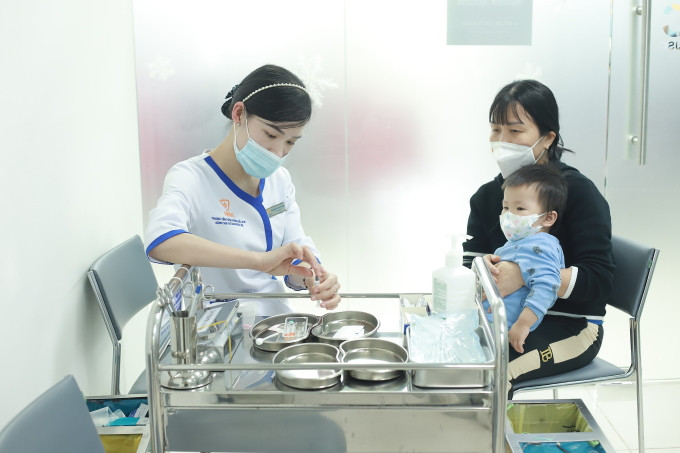Respiratory diseases are among the "recurring" diseases in children when the seasons change and the weather turns cold. They can be prevented by getting enough vaccines, increasing physical activity, and keeping warm.
In early November, children's hospitals in Ho Chi Minh City recorded an increase in the number of sick children: the examination department of Children's Hospital 1 received 4,500 children every day, mainly with respiratory diseases; the Respiratory Department 1, Children's Hospital 2 always had about 250-260 sick children, an increase of one and a half times compared to early October.
Dr. Truong Huu Khanh, Vice President of the Ho Chi Minh City Infectious Diseases Association, said that this year, respiratory diseases occurred in both young children and children over 5 years old. The reason is that children have to stay at home for a long time because of Covid, so their immunity to common infectious diseases is reduced. When they return to community activities and are exposed to pathogens, children are more susceptible to illness.
In addition, many types of viruses that cause respiratory infections such as influenza, adenovirus, respiratory syncytial virus (RSV) are circulating at the same time, causing children to be infected with many strains of viruses at the same time or to get sick with another disease after recovering from one. This explains why children who do not have full immunity often have prolonged illness that recurs many times.
In the context of Ho Chi Minh City in the rainy season and the North having monsoon, Dr. Bui Thanh Phong, Medical Manager of VNVC Vaccination System, has given 5 notes to help families take care of their children's respiratory health.
Vaccination
Children need to be fully vaccinated to strengthen their immune system against diseases. Currently, Vietnam has vaccines to prevent many infectious diseases that attack the lungs such as influenza, pneumococcus, diphtheria, whooping cough, measles, etc.
In particular, influenza vaccines help prevent pneumonia, bronchitis, and blood infections, while reducing the risk of hospitalization and need for intensive care (ICU) by 74% in children and the risk of death by more than 31%. Pneumococcal vaccines reduce the incidence of purulent meningitis, otitis media, and pneumonia. Diphtheria and pertussis vaccinations help reduce respiratory complications such as airway obstruction, pneumonia, bronchitis due to secondary infection, and severe coughing...
When vaccinating their children, parents need to follow the basic and booster vaccination schedule, especially for children aged 4-6. In addition, family members or caregivers also need to vaccinate to prevent disease and avoid infection to children.

Influenza, pneumococcal, diphtheria, whooping cough, measles... can now be prevented with vaccines.
Keep warm
Cold air is the ideal condition for pathogens to thrive. The flu virus can survive for hours in cold, low-humidity environments.
According to Dr. Phong, children breathing cold air also affects the immune response in the respiratory tract. Cold weather also dries out the eyes and mucous membranes in the nose and throat, making it easier for bacteria and viruses to invade the body.
Therefore, to prevent illness in children, families need to keep their children warm by wearing extra clothes, scarves, shoes and socks when the weather turns windy. Children should bathe in warm water, in a windproof room, dry and put on warm clothes immediately after bathing. The space where children live also needs to be kept warm, avoiding drafts.
Note, when keeping children warm, dress them in thin layers, instead of thick layers. Parents should check the temperature to dress their children in the appropriate number of layers. Dressing them in too thick clothes can lead to sweating, making it difficult for them to move and breathe.
Keep clean
Cold weather often makes children reluctant to bathe and change clothes for the sake of keeping warm. However, daily body hygiene is essential to eliminate the hiding places of pathogens. In addition, children also need to keep their hands clean, use clean toys and school supplies. If children are sick, hand and body hygiene also helps limit the spread of pathogens.
Bathing your baby on cold days should not be too long, with the water temperature not too different from body temperature. Do not bathe your baby too early in the morning or too late in the evening because these are two times when the environmental temperature drops, which can cause heat shock.
Parents should pay attention to hand hygiene for children when they come into contact with or handle objects in public places or after coming home from school. Children should limit putting their hands on their eyes, nose, and mouth to avoid bringing pathogens directly from their hands into their bodies.
Adults should wash their hands thoroughly before coming home and coming into contact with children, wear masks when going to public places, and quit smoking. Passive smoking in children can easily cause respiratory infections, creating favorable conditions for viruses and bacteria to attack.

Keeping the body warm and the environment clean is a way to limit pathogens from entering the child's body.
Ensure nutrition
When entering the cold season, families need to ensure that children eat a full range of nutrients, limiting fried and greasy foods. Parents should also give their children more fruit to supplement vitamins and minerals.
At the same time, children need to be regularly hydrated. If they do not drink enough water, parents can supplement their children with nutritious drinks according to their preferences such as smoothies, fruit juices, milk, etc.
Ensuring nutrition not only maintains weight and development for children but also provides energy to ensure children's immune system works effectively to fight disease.
Increase movement
Cold weather can cause children to be less active, staying indoors to keep warm. Families should encourage their children to play sports, increase the frequency of exercise appropriate to their age, to continue to develop mentally and physically.
Many studies have also shown that exercise helps children develop confidence and strengthens their natural immunity. At the same time, reasonable exercise helps increase the effectiveness of vaccines, helping the body produce immunity faster than without exercise.
Do not self-medicate
When a child is sick, a specialist should examine them and prescribe the right medication. Families should not buy their own medicine or give their children antibiotics without a prescription. Using medicine on your own can increase antibiotic resistance, cause side effects, and prolong or worsen the illness.
In addition, some diseases have symptoms that are easily confused. Even if the child is sick and has the same symptoms as before, parents should not reuse the old prescription for their child, to avoid missing the golden time for treatment.
According to VnExpress